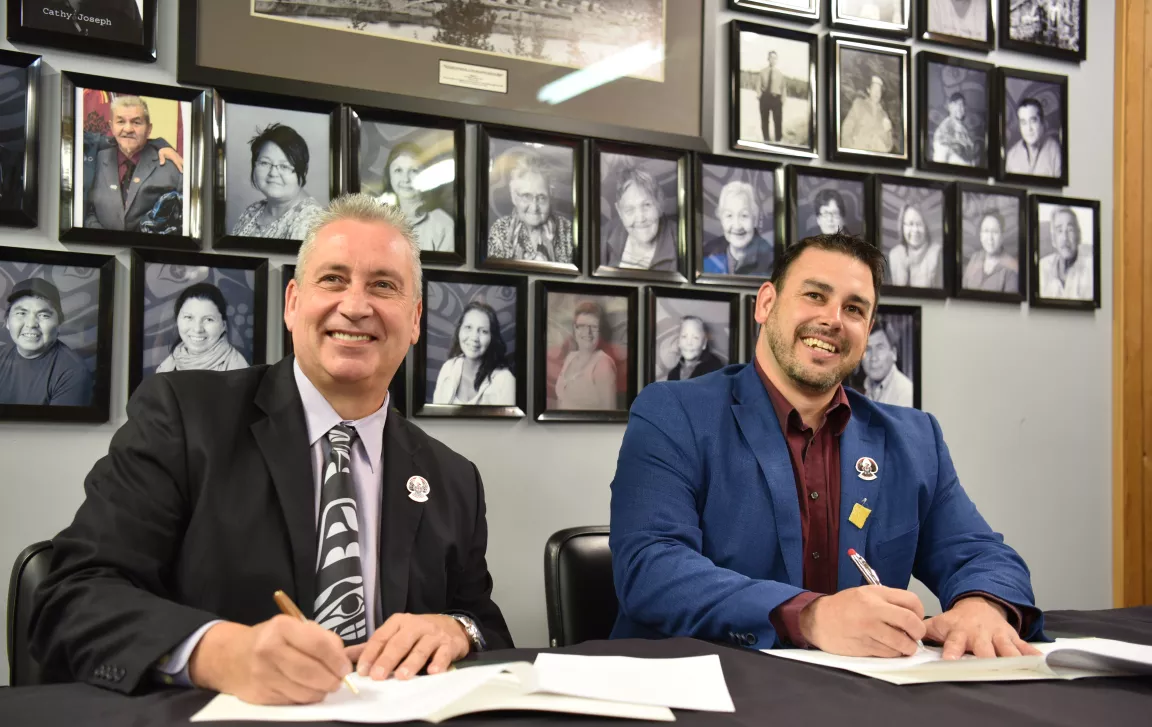Lheidli T’enneh and UNBC create new opportunities for Lheidli students

Prince George, B.C. – The Lheidli T’enneh Nation (LTN) and the University of Northern British Columbia (UNBC) have developed a new partnership that will support Lheidli students in gaining access to post-secondary education, a direct and meaningful response to Canada’s Truth and Reconciliation Commission Calls to Action.
The two parties signed an Agreement today that outlines the partnership, believed to be the first of its kind in Canada. It provides two options for members of the Lheidli T’enneh Nation to attend UNBC at no cost to the student. The University’s largest, central campus in Prince George is located on Lheidli T’enneh territory.
Chief Clay Pountney states “This new Agreement with UNBC is a specific example of what reconciliation looks like. It describes a new partnership that requires investments from both parties to benefit Lheidli students. I’m not aware of a similar partnership anywhere in Canada. This is a win-win for both ourselves and UNBC. It also addresses a common misunderstanding in Canada that all Indigenous people have unlimited access to post-secondary education, which simply isn’t the case. Our partnership with UNBC creates new post-secondary opportunities for our students and this will help our Nation move forward.”
Chief Pountney continued “This is the second Agreement we’ve signed with UNBC. The first signed in 2016 described the governance of our relationship with UNBC. A new sign at the entry to the campus on University Way was unveiled to celebrate the relationship. We’ve enjoyed a respectful and mutually beneficial relationship with UNBC from the time the university was first proposed. Our Elders were there when Her Majesty, Queen Elizabeth II officially opened UNBC in 1994. Today, we take another step forward in our journey together and we look forward to more partnerships in the future.”
Canada’s Truth and Reconciliation Commission made numerous calls to action regarding education. While the calls recommended the federal government take action, the Lheidli T’enneh Nation and UNBC are addressing the calls’ spirit in areas such as developing joint strategies to eliminate educational gaps between Aboriginal and Non-Aboriginal Canadians, providing funding to close identified educational achievement gaps, improving attainment levels and success rates, and enabling community responsibility.
“The Truth and Reconciliation Commission made it very clear that Canada, as a nation, simply must do better with regards to making education accessible for Aboriginal peoples. Today, the Lheidli T’enneh and UNBC have taken a significant stride towards that, demonstrating what is possible when we are limited only by our aspirations,” said Dr. Daniel Weeks, UNBC President and Vice-Chancellor. “This is leadership in an area in which our country needs it, and is another northern B.C. initiative that has the potential to have national impact.”
The first program, called the Lheidli T’enneh Northern Promise Partnership Program, provides candidates who meet UNBC admission requirements with the funding they need to achieve an undergraduate degree at UNBC. The University provides full tuition support for a full undergraduate degree, and the Lheidli T’enneh Nation will cover funding to support student needs such as living expenses, including housing, food, and transportation, fees (other than tuition), textbooks, and tutoring.
The second program, called the The Lheidli T’enneh Northern Promise Partnership Transition Program, is available to Lheidli T’enneh identified students who do not meet the normal admission requirements for UNBC entrance, yet demonstrate strong academic promise, or wish a transition experience from high school or college to University. UNBC will provide full tuition support and the Lheidli T’enneh Nation will cover funding to support student needs.
While being viewed as a meaningful response to the Calls to Action, the programs also reflect goals set forth by the United Nations in that body’s Sustainable Development Goals, specifically related to quality education. That document repeatedly references equitable access and opportunity, and states specifically that society strive to ensure equal access to all levels of education and vocational training for indigenous peoples.
Lheidli T’enneh members interested in learning more about accessing these programs should contact the LTN Band office to discuss eligibility.
-30-
About the University of Northern British Columbia
Located in the spectacular landscape of northern British Columbia, UNBC is one of Canada’s best small universities. We have a passion for teaching, discovery, people, the environment, and the North.
UNBC provides outstanding undergraduate and graduate learning opportunities that explore cultures, health, economies, sciences, and the environment. As one of BC’s research-intensive universities, we bring the excitement of new knowledge to our students, and the outcomes of our teaching and research to the world. In addition to fostering and celebrating academic excellence, UNBC is a welcoming place, with a learning environment that is friendly, inclusive, and supportive.
UNBC is a university both in and for the North. This mission has instilled a strong sense of ownership, purpose, and adventure among our students, alumni, faculty, staff, and the communities we serve. We are also Canada’s Green University™, leading the way to a more sustainable future for all.